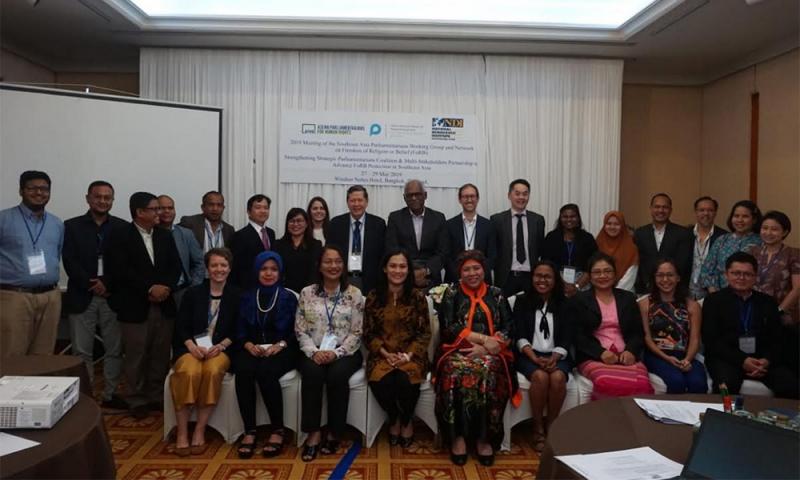Revisit the Parliamentary Interfaith Commission to foster interfaith dialogue
MP SPEAKS | With the rise of extremists and radicals determined to play the deadly race and religious card to destabilise political harmony in Malaysia, the time is ripe to revisit and re-establish an independent Parliamentary Interfaith Commission for greater interfaith dialogue and as a catalyst for nation-building.
Post-May 9, 2018, after a historic regime change, there has been an obvious rise of vicious comments and attacks against Malaysians of a different faith, ethnicity and belief; openly and on social media, mostly behind fake accounts, and some brazenly wearing their badges as instigators of hatred and bigotry with no shame.
In 2005, the formation of the Interfaith Commission of Malaysia was initiated by the Human Rights sub-committee of the Bar Council and attended by more than 200 representatives from 50 religious groups, political parties, civil societies and Malaysians at a two-day conference in Bangi.
The main objective of the formation of this commission was to act as an independent advisory body, conciliatory body, and a consultative body, not an adjudicatory body as claimed by some ill-informed parties in the past to deal with issues pertaining to freedom of religion and belief.
The commission was intended to promote awareness of the tenets and beliefs of the diverse religions and faiths of the world and to act as a conductor to highlight problems to the relevant authorities for a solution.
Needless to say, the idea was shot down by grossly flawed arguments from parties who feared that the commission will have powers to mete out verdicts and act as a decision-making body, or to pigeonhole any particular religion, be it Islam or other religions.
The idea of an interfaith commission died a natural death although there had been efforts to resurrect it by rebranding it as the Committee to Promote Understanding and Harmony Among Religious Adherents (JKMPKA) in 2016, but to no effect or impact.
A bridge across the divide
Fast forward to 2019, amid efforts by religious leaders to foster love, understanding and respect this Ramadhan by organising breaking of fast events amongst people of various religious beliefs, in the background lies a dark, sinister scenario.
At a time where opinions and comments on religion and belief can be viciously attacked by derogatory, racist and xenophobic responses, the establishment of this interfaith commission will act as a bridge to create platforms for understanding, interaction and dialogues - be it academic, intellectual or religious - to foster goodwill and unity amongst the different ethnicities, religions and beliefs in Malaysia, within the parameters and framework of the law, and the Federal Constitution that is the supreme law of the land.
In the past, the race and religion card had been abused so much by the previous regime to divide and rule that the deep-seated hatred against people of different religions, cultures, and beliefs is beginning to rear its ugly head now under Pakatan Harapan in this Malaysia Baharu.
The various religions, beliefs and cultures in Malaysia have uniquely more in common than the differences as propagated irresponsibly by certain quarters, who have a twisted vested interest in the power-play in the country.
The PAS member of parliament for Kuala Nerus Khairuddin Aman Razali recently objected to promoting interfaith understanding through his statement that Islam should be taught to non-Muslim students.
While his suggestion is welcomed in the spirit of unity, the same concept must be accorded to our Muslim friends to learn, understand, and respect other religions, beliefs and cultures of other Malaysians.
Khairuddin is a thorn in the flesh when he misplaced the educational approach on religion and belief versus a farfetched argument on the provisions in the Federal Constitution on the prohibition of propagation of other religions to Muslims.
He is a classic example of why we need a Parliamentary Interfaith Commission so that a greater dialogue will be in place to speak about the unifying factors within different religions and beliefs that foster respect and co-existence in harmony, rather than to instil fear of different religious theologies, practise and beliefs.
A chisel against disunity
Malaysians, lawmakers, civil societies and religious leaders must go beyond arguing over differences in theology or on religious practices and beliefs, and realign the discussion on religion and belief to unify and consolidate similar practices and beliefs.
Religious diversity in a new Malaysia must now function as the bridge between the rakyat and places of worship.
Religious leaders have a new weapon now - a chisel, to slowly hack away at the monstrous wall erected by the previous regime that functioned as a wedge to keep Malaysians divided and disunited.
A concerted effort is needed by all to not only initiate interfaith dialogues and discourses but also for the silent, moderate majority to stop being silent and to speak up against anyone attempting to derail national unity and respect for different religious beliefs, practices and civilisations.
By revisiting and establishing the Parliamentary Interfaith Commission, Malaysia as a land where the world’s greatest religions congregate will set a sterling example to the rest of the world, of our blueprint of harmony and unity through interfaith and inter-civilizational dialogues cemented through mutual respect, freedom of expression and freedom of religion and belief.
Greater religious freedom and interfaith dialogues will certainly be the catalyst to nation-building in a new Malaysia.
KASTHURI PATTO is the member of Parliament for Batu Kawan and Wanita DAP international secretary.
The views expressed here are those of the author/contributor and do not necessarily represent the views of Malaysiakini.
RM12.50 / month
- Unlimited access to award-winning journalism
- Comment and share your opinions on all our articles
- Gift interesting stories to your friends
- Tax deductable
